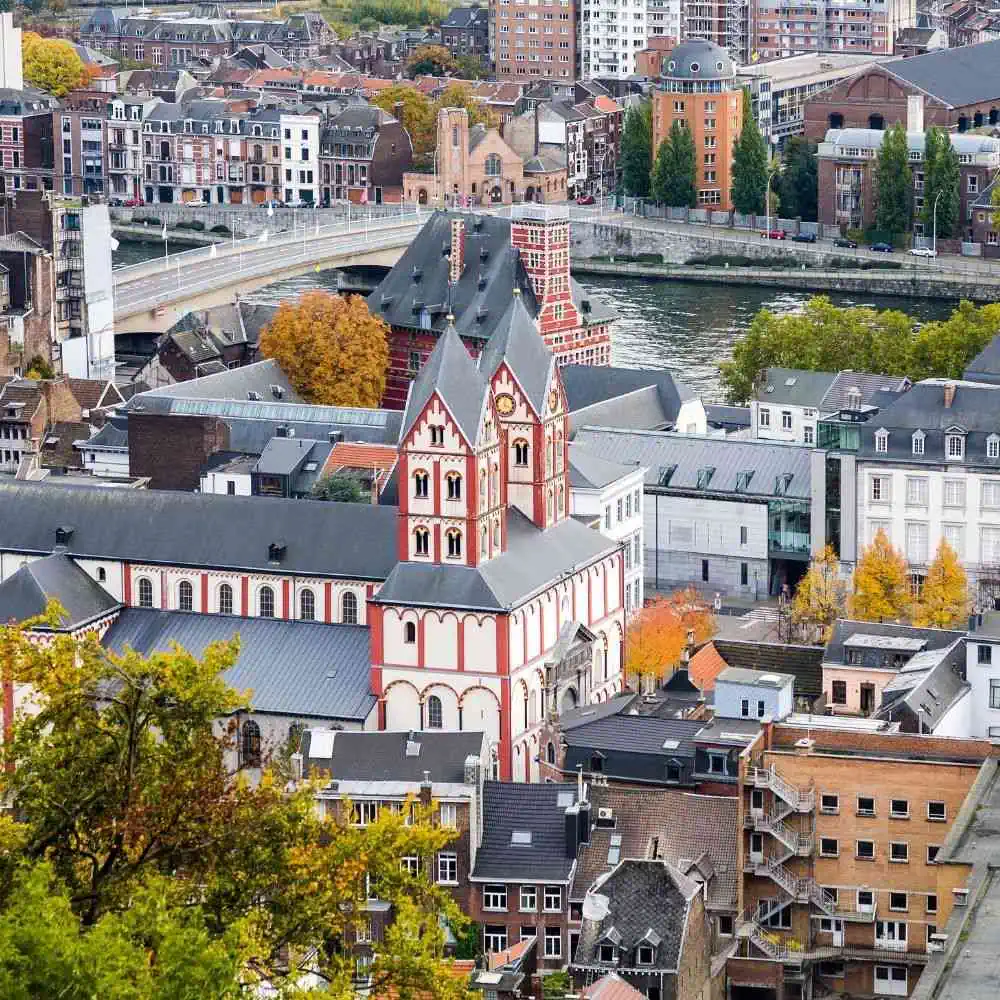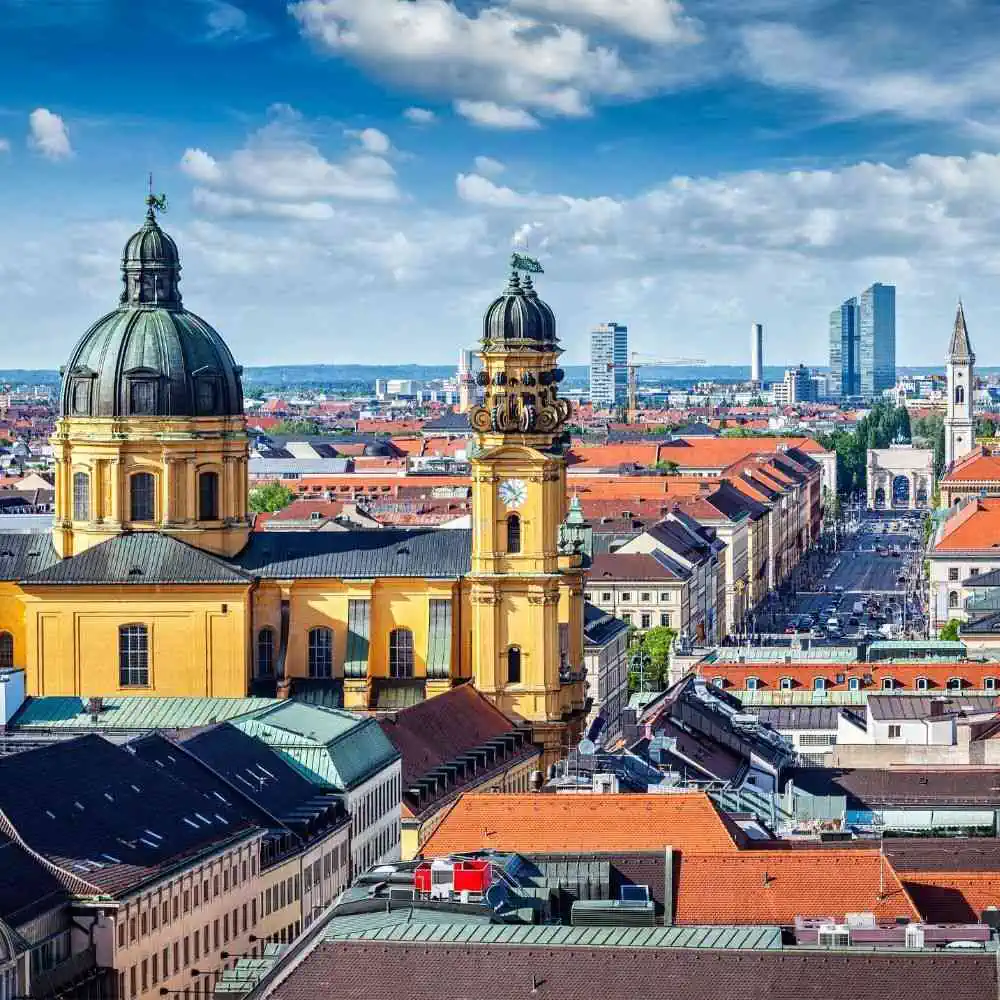You will depart from Munchen Hbf, located right in the city center of Munich, and enjoy the beautiful scenery of the journey while you arrive in Liege Guillemins, also located in the heart of Liege.
Trains from Munich to Liegefrom € 80.00
Trains from Munich to Liege
Travelling by train: Munich - Liege

Journey details
How long does that train from Munich to Liege take?
The journey from Munich to Liege usually takes around 8 to 10 hours, depending on the specific route and whether transfers are required.
What is the fastest journey from Munich to Liege by train?
The fastest train journey from Munich to Liege can take as little as 7 hours and 45 minutes with optimal connections and minimal transfer times.
How much does the train cost from Munich to Liege?
Train tickets from Munich to Liege vary, with prices starting from approximately €80 to €150, depending on the class, time of booking, and availability.
How much does the Munich to Liege?
No, there are no direct train services from Munich to Liege. At least one transfer is required, commonly in Frankfurt or Brussels.
What is the distance from Munich to Liege by train?
The distance by train from Munich to Liege is approximately 700 Km.
Which are the cities that the train stops from Munich to Liege?
On the route from Munich to Liege, common stops include Frankfurt, Cologne, and Brussels. The exact stops can vary based on the service and transfers chosen.
Munich: Places to see
Munich (München), in Germany is a fascinating destination that offers visitors a blend of city delights, lively culture, and rich historical and architectural gems to explore. From soaring cathedrals to beautiful parks to world-famous beer halls, there is something for everyone in this Bavarian city. Here is a list of seven must-visit sites while in Munich, including information on each spot’s historical and architectural significance, practical details, and insider tips.
Nymphenburg Palace: The grand Baroque palace, built for Elector Ferdinand Maria in 1664, is now a museum featuring beautiful galleries and gardens. Located in the western section of Munich, it is a great spot for a leisurely stroll. Entrance is €12.50 and it’s open until 6 pm. Take a guided tour to learn more about its history.
Hofbräuhaus: This legendary beer hall has been around since 1589, and remains one of the most iconic spots in Munich. Here, visitors can sample the city’s famous Bavarian beer while enjoying traditional Bavarian dishes. Prices are quite reasonable and its open until at least 11 pm. Come early to avoid the crowds and find a good seat.
Marienplatz and City Hall: Located in the heart of the city, Marienplatz is one of Munich’s most iconic squares. The Old City Hall (Altes Rathaus) here is a magnificent Gothic building, while the New City Hall (Neues Rathaus) boasts a unique Neo-Gothic exterior. Free to visit. Catch the famous Glockenspiel at the New City Hall at 11 am or 12 pm.
English Garden: This large public park is a haven of nature and tranquillity in Munich. Spanning an area of more than 920 acres, it’s a great spot for a relaxing walk or a picnic. It also features a beer garden. Free to visit. Take a boat ride along the lake for the perfect romantic evening.
Frauenkirche and St. Peters Church: Located on Munich’s central pedestrianised street, these two churches are important landmarks that offer visitors a glimpse of the city’s religious traditions. Frauenkirche is an impressive Gothic building, while St. Peters is a more modern structure. Free to visit. Look out for the beautiful stained glass windows inside.
BMW Museum: Learn all about the famous German carmaker at this factual and educational museum in Munich. Visitors get a comprehensive overview of the company’s history, as well as a chance to explore some of its iconic cars. Entrance is €12 and the museum is open until 8 pm. Book a guided tour to get the full experience.
Viktualienmarkt: This colorful, traditional food market is the perfect place to sample some of Munich’s local specialties. Here, visitors can find Bavarian sausages, freshly baked pretzels, cheeses, cakes, and plenty of other delicious treats. Free to visit. Stop by on a Sunday morning to experience the market in all its glory.
A trip to Munich provides a wealth of experiences for travelers, from beer halls to old churches to fascinating museums. Whether you’re looking for a cultural exploration or a romantic getaway, the city’s diverse offerings guarantee an enjoyable time.

Liege: Places to see
Liège, located in the beautiful region of Wallonia, Belgium, is the perfect destination for history and architecture lovers. The city is home to stunning landmarks, and a wide variety of delicious cuisine. To make the most out of a visit to Liege, here is a list of must-visit historical and architecturally significant sites, as well as some of the best places to eat.
Notre-Dame de Liesse Cathedral: This incredible Romanesque and Gothic-style cathedral was built in the 12th century, and its walls and stained glass windows serve as a testament to the city's rich history. Visitors can explore the cathedral in-depth with a guided tour, or take the audio-guided tour to learn more about the site's history and architecture. Location: Rue de la Clef, Liege. Hours: 9am to 5pm, Mon-Fri; 9am to 7pm, Sat; 10am to 6pm, Sun. Entrance fee: Free.
La Boverie: La Boverie is a stunning art museum situated within the iconic Les Jardins de la Boverie park, a perfect spot to take a break and enjoy the sunshine. The museum boasts an impressive collection of artworks from world-renowned artists, including Salvador Dali, Van Gogh, and Picasso. Location: Rue des Guillemins, Liege. Hours: 10am to 5pm, Tues-Sun. Entrance fee: €7.
Vennes Vignoble: Vennes Vignoble is a beautiful, family-run vineyard located in the outskirts of the city. Visitors can enjoy a tour of the vineyards and learn about the winemaking process, before sampling some of the delicious wines the vineyard produces. Location: Liège. Hours: 9am to 6pm, Mon-Sun. Entrance fee: Free.
Les Arènes de Mars: This historical arena was once the site of gladiatorial battles, as well as bullfights, chariot races, and other sports. Today, the arena is home to a variety of events, from concerts to sports games. Location: Place de Mars, Liège. Hours: Varies. Entrance fee: Free.
Grand Curtius: Grand Curtius is a stunning museum dedicated to Liège's history, located within a building of architectural significance. The museum's permanent exhibitions provide visitors with an in-depth look at the city's history, culture, and art. Location: Quai Sainctelette, Liege. Hours: 10am to 5pm, Mon-Sun. Entrance fee: €8.
The Citadel of Liège: The Citadel of Liège is a fortress that was built in the 17th century to protect the city from invasion. Inside the citadel, visitors can explore the dungeons, towers, and other historical features. Location: Place de la Citadelle, Liège. Hours: 8am to 8pm, Mon-Sun. Entrance fee: €5.
Where to Eat: Liège is home to a variety of delicious culinary delights, from traditional Belgian cuisine to international dishes. Some popular spots are La Résidence, an upscale French restaurant, and Le Saint-Gilles, a traditional bistro.
At the end of the day, Liège is an unforgettable place to visit. Whether exploring the architectural beauty of its churches and monuments, or indulging in some of its delicious cuisine, there is something here for everyone. So pack your bags and get ready for an unforgettable journey into the past!

Munich: Main train stations
Munich, in Germany is home to the country's largest train station, München Hauptbahnhof. Connecting the city to over 150 destinations and serving as many as 450,000 passengers a day, it is the busiest train station in Germany. There are also other important train stations in Munich such as München Ost, München Pasing or München Laim.
München Hauptbahnhof is situated at Bayerstrasse 10a-c, 80335 Munich. It is open 24 hours a day, 7 days a week. There are several services available, including luggage storage and a staffed information desk. The station can be reached by car and public transport such as S-Bahn, U-Bahn and buses, and is located near the city center, allowing passengers to reach popular tourist attractions easily.
- Munchen Hbf
- Munchen Ost
- Munchen-Pasing
- Munchen Hackerbrucke
Liege: Main train stations
The main train station of Liège is Liège-Guillemins, located in the city center of Belgium. It connects the city to other major cities in Europe, such as Brussels and Paris. There are also other important train stations in Liège, such as Liege-Palais, Gare des Guillemins, and Sclessin.
Liège-Guillemins is located at Bedfordstraat 87, Liège and it is open from 4:30am to 12:00am. You can contact them by telephone at +32 4 222 48 11, and luggage storage is available on site. There is also a tourist information center at the station that can give you tips about attractions to visit and other transportation options in the city.
- Liege Guillemins
- Liege Saint-Lambert
- Liege Carre
Munich - Liege: How to get the best deals
Book in Advance:
Just like with airfares, train ticket prices tend to rise as the departure date gets closer. Booking weeks or even months in advance can save you a significant amount.
Travel During Off-Peak Hours:
Avoid traveling during peak times such as weekday mornings and evenings. Opt for midday, late evening, or mid-week rides when there's less demand.
Consider Slower Trains or non direct routes:
Express or high-speed trains might save time, but they're often pricier. Opting for regional or slower services can reduce your fare.
Look for Special Deals and Promotions:
Train operators occasionally have promotions or special deals, especially during off-peak seasons. It's worth signing up for newsletters. Additionally, there are sometimes group or return ticket discounts, so consider these options if they fit your travel plans.
All you need to know about
Need our help?
Guaranteed secure payment
Certificates


